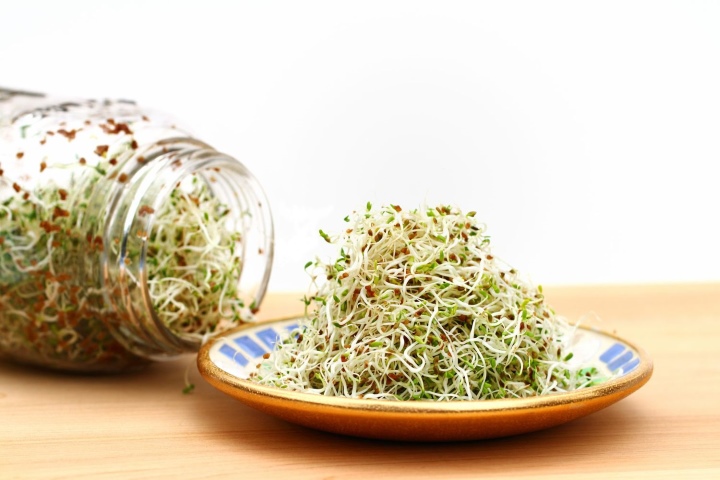Have you heard of alfalfa before? It’s not just food for rabbits and horses! This superfood has been used for centuries to promote health and well-being. You’re about to learn 15 science-backed ways alfalfa can benefit your skin, hair, and overall health. With its wonderful nutritional profile and medicinal properties, alfalfa is an easy addition to your diet that can make a big difference.
In This Article:
What is Alfalfa?
Alfalfa, also known as lucerne, is a flowering plant that belongs to the legume family. It is rich in vitamins, minerals, proteins, and other beneficial plant compounds. Alfalfa has been used for centuries to treat various health conditions. It is cultivated as an important forage crop around the world. Here are some of the top benefits of alfalfa:
Benefits of Alfalfa
Great for Heart Health
Alfalfa contains coumarin, a compound that may help thin the blood and improve circulation. These properties make alfalfa excellent for heart health and reduce the risk of heart disease.
Helps Control Blood Sugar Levels
Alfalfa may have anti-diabetic effects and help control blood sugar levels. It is high in chromium, a mineral that helps cells respond properly to insulin and can help reduce insulin resistance in the body.
Promotes Digestive Health
Alfalfa contains compounds like saponins that can help stimulate the appetite and promote digestion. It may help improve the absorption of nutrients from food. Alfalfa can act as a natural laxative as well, helping prevent constipation.
Strengthens the Immune System
Alfalfa is loaded with compounds like chlorophyll, antioxidants, amino acids, and minerals that can help boost the immune system. Alfalfa can also help the body produce new immune cells and antibodies to fight infections.
Rich in Antioxidants
Alfalfa is a great source of antioxidants like quercetin, isoflavones, and chlorogenic acid that help neutralise harmful free radicals in your body. The antioxidants in alfalfa can help prevent cell damage and promote better health.
Lowers Cholesterol
Alfalfa contains plant sterols that can help lower cholesterol levels. The saponins in alfalfa also help lower cholesterol by binding to bile acids in your gut and preventing their reabsorption into the bloodstream.
Improves Bone Health
Alfalfa is high in calcium, manganese, copper, and protein, which are all important for bone health and preventing conditions like osteoporosis. Calcium and manganese are important for bone strength and mineralization.
Reduces Inflammation
Compounds in alfalfa, like coumarins and saponins, have anti-inflammatory properties that may help reduce inflammation in the body and may help with conditions like arthritis and asthma.
Good for Skin
The vitamins, antioxidants, and amino acids in alfalfa make it good for nourishing and hydrating your skin. It is a herbal remedy for people with skin conditions like acne, eczema, and psoriasis.
Improves Hair Health
The nutrients in alfalfa, like vitamins, minerals, and proteins, nourish your hair and scalp from within, helping promote hair growth and strength. It also prevents the formation of dandruff.
Relief from Menopause Symptoms
Alfalfa is high in plant compounds called phytooestrogens, which are similar to the hormone estrogen in women. This can ease menopausal symptoms that are caused by decreased levels of estrogen.
Promotes Detoxification
The fibre, antioxidants, and nutrients in alfalfa help remove toxins from the body, promoting detoxification. Alfalfa is also rich in chlorophyll, which gives it a green pigment and helps cleanse the body.
Boosts Energy Levels
Alfalfa is a good source of B vitamins that help boost your energy levels and metabolism. Folate and B vitamins are important for energy production, cell growth, and many other bodily functions.
Supports Liver Health
Alfalfa supports liver health and can aid in detoxification. The antioxidants, amino acids, and phytochemicals in alfalfa support liver function, protect it from damage, and, over time, make your liver healthy.
Urinary Tract Diseases
Alfalfa acts as a natural diuretic for treating urinary tract diseases, such as kidney stones and urinary tract infections (UTIs). As a natural diuretic, alfalfa promotes urine flow, which can help to clear out harmful bacteria.
How do I use Alfalfa?
You can find alfalfa in supplement form as tablets, capsules, powders, and extracts. Alfalfa sprouts and seeds can be added to salads, sandwiches, and smoothies. Alfalfa leaf tea can be made by steeping 1-2 teaspoons of dried alfalfa leaves in hot water for 10–15 minutes. You can also get alfalfa in liquid extracts and powders to add to foods and beverages. When consuming alfalfa, the typical dosage is around 5 to 10 grammes of dried herb three times per day, or as directed on the product packaging. You can adjust the dosage based on your needs and tolerance.
What Are the Side Effects of Alfalfa?
While alfalfa is generally considered safe in small amounts, higher doses of alfalfa supplements or drinking lots of alfalfa tea may lead to some side effects.
Stomach Upset
Alfalfa leaf contains compounds called saponins that can irritate the stomach. High amounts of alfalfa may cause nausea, diarrhoea, and bloating in some people.
Blood Clotting Changes
Alfalfa contains a compound called coumarin that may slow blood clotting. This could increase your risk of bleeding or bruising. Talk to your doctor before taking alfalfa if you take blood thinners or have a bleeding disorder.
Autoimmune Disease Flare-ups
Alfalfa may stimulate the immune system. If you have an autoimmune condition like rheumatoid arthritis, multiple sclerosis, or lupus, alfalfa could worsen your symptoms. It’s best to avoid alfalfa supplements.
Children and Pregnant Women
Alfalfa is considered safe for short-term use in children and during pregnancy in normal amounts, but high doses may be unsafe. Do not give alfalfa supplements to children unless they are recommended by a doctor. Pregnant women should also talk to their doctor before taking alfalfa supplements.
Conclusion
Alfalfa has some pretty impressive health benefits that are worth exploring. While more research is still needed, the preliminary studies show alfalfa may help lower cholesterol, manage diabetes, prevent osteoporosis, and even fight cancer. Plus, it can do wonders for your skin and hair. So consider adding this nutrient-dense green to your diet. Start small by sprinkling some alfalfa seeds on your salad or blending alfalfa sprouts into a smoothie. You may just find this unassuming plant a new staple in your kitchen. With potential benefits for your whole body, it’s worth giving this superfood green a try.
Sources:
2. https://www.stylecraze.com/articles/amazing-benefits-of-alfalfa-for-skin-hair-and-health/













